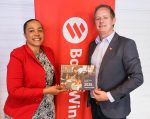By Christopher Freygang
The winds of change are flowing through the huge Namibian insurance industry, carrying with them a revolution fuelled by an unexpected ally: behavioural economics. The perception of insurance as a lifeless, uninteresting industry has changed; now, it reflects the liveliness of human behaviour and the complex interplay of choices and biases. Insights from behavioural economics are transforming the entire nature of insurance, improving consumer engagement, improving risk assessment, and reinventing policy design.
Insurance has always been fundamentally about reducing risk and supplying financial security. However, the human element—the quirks, emotions, and prejudices that influence our decisions—is something that standard models frequently ignore. The study of these subtleties is known as behavioural economics, and it is finding more and more application in the insurance industry. Insurance companies are realising that better tactics might result from a knowledge of the factors that influence people’s decisions.
The importance of client involvement has increased in the Namibian insurance sector. The power of nudges and choice architecture in capturing the customer’s attention has been revealed by behavioural economics. Insurance providers are quietly influencing customers’ selections by presenting options differently, streamlining complex procedures, and employing personalised communication. These tactics not only improve customer satisfaction but also create a deeper sense of trust and loyalty.
The cornerstone of the insurance sector, risk assessment, is being profoundly altered by behavioural insights. Traditional underwriting made extensive use of actuarial calculations and historical data. These projections, however, may become significantly more volatile due to the human aspect. Insurance companies are already adding behavioural indicators to their traditional models. They can get a more detailed understanding of individual risk profiles by analysing the behavioural and decision-making patterns of their customers. Fairer pricing and better risk management are made possible as a result.
In the past, insurance policies frequently appeared to be universally applicable solutions that failed to take policyholders’ particular requirements and preferences into account. Economic behaviour has altered the rules of the game. Insurance companies tailor their plans to fit with psychological principles. This entails creating rules that adapt to changing circumstances in life, providing incentives for good behaviour, and creating products that better reflect client preferences. By doing this, insurers are lessening the moral dangers that have plagued the sector while simultaneously satisfying the demands of their customers.
Trust is a currency that is worth more than gold in an increasingly digital society. The study of behavioural economics offers important insights on establishing and sustaining trust in the insurance industry. Insurance businesses can build confidence that goes beyond the small print by using open communication, concise policy explanations, and moral business practises. These actions are changing the sector in Namibia, where trust is particularly important.
The introduction of behavioural economics is dramatically changing the insurance business in Namibia. This partnership between human behaviour and insurance has a significant impact on everything from improving consumer interaction to improving risk assessment and policy design. As insurers continue to respond to these findings, the market will change to provide more dependable, fair, and customer-focused insurance options. One thing is certain in this exciting nexus of economics and insurance: Namibian insurance clients have a brighter, more exciting future thanks to the winds of change.
Christopher Freygang is Product Marketing Specialist, Personal Finance, Old Mutual Namibia










